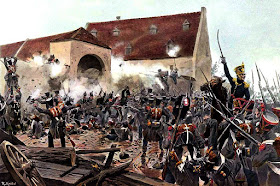
The picture below of La Haye Sainte is a sketch by J M W Turner, giving a nice sense of the relief, but little more.

A similar view can be seen below:

Despite the plethora of information available on La Haye Sainte, there is one aspect which I find hard to fathom: what was its colour? specifically, was the farmhouse whitewashed or not? and did it have a red tiled or a grey slate roof?
The most reliable source ought to be William Siborne.

Of his two models, the larger at Leeds Royal Armouries suggests red brick walls and grey slate roofing:
The smaller scale model in Chelsea suggests the same:

But herein lies the problem: most paintings, drawings and prints of the farmhouse completed near to the time of the battle suggest that it was whitewashed with a grey slate roof:
By the time the late 19th Century artists began to represent scenes from the battle, they tended to show the farmhouse whitewashed and with a red tiled roof:
Many modern modellers have tended to show the farmhouse fully whitewashed, and with a grey slate roof:
Others have shown the roof of the stables and barn in red tiles and the farm in grey slate:
I believe that, like many old buildings in the area, La Haye Sainte has probably been whitewashed, weathered and re-whitewashed repeatedly over the course of its history. Immediately after Waterloo, there are images that suggest the whitewashing was very patchy. The roof appears to be all grey slate. One can assume that damage done during the battle will have exacerbated this situation.
All things considered, I think this is a fair reflection of what it looked like on 18 June 1815:
We can also guess that the barn and stables roof was extensively damaged and that it was partly redone in red tiles.
The most famous painting of the interior of the farmhouse during the battle shows a scene of intense action, presumably just before its fall as the KGL riflemen attempt to defend the building as the French enter:

This close up shows the CO of the Battalion, Major Baring, directing operations.
The assault on the front gate from the French perspective:
And the same scene from the inside:
I believe the fall of La Haye Sainte can be attributed to two factors: first, the garrison ran out of its specialist Baker Rifle ammunition; secondly, not realising that they would form the garrison on the day of the battle, they rather foolishly burnt the west barn door during the torrential rain the night before. Here is a shot of that door:
Here is Georg Baring in later life. Interestingly, his Battalion, 2nd Light Battalion KGL, was later commanded by Rommel in the Great War and continued to have Waterloo as a battle honour.
So that is my analysis, but I may be wrong and I would appreciate any other views. My La Haye Sainte was one of my earliest posts. Before I begin to populate it with troops is there anything I should change? All advice gratefully received!

























What a fascinating post. I recently bought the Airfix model (nostalgia overcame me), and thought that red bricks was definitely the way to go. Siborne new his subject.
ReplyDeleteWM
That's a terrific post James - I think you have convinced me that it was a bit scruffy before the battle, with weathered limewash here and there, and was re-roofed in red afterwards. Mental note to myself - I must go and look at Siborne's efforts - I've been promising myself that I will, for about 20 years.
ReplyDeleteThanks to you both - it's been fun doing the detective work!
ReplyDeleteGreat, do you have a pic now on your model? How did you think about the windows in the model? I am worling on my Airfix La Haye Sainte right now!
DeleteOne question that has been bugging me - Siborne clearly shows the Main Barn significantly reset with respect to the Stables and the southern Passage, however the existing structure shows the western face only slight set back. Was the Main Barn extended sometime between 1815 and 2019?
ReplyDeleteExelente analisis....de lo mejor que he encontrado en mi investigacion. Muchas gracias por compartirlo
ReplyDeleteGreat analysis. I have also wondered this and I am sitting with the model from Airfix and I am painting it all over again and fixing the windows to look more natural. Any idea how the windows looked like?
ReplyDelete